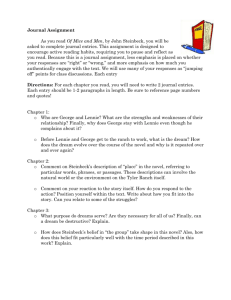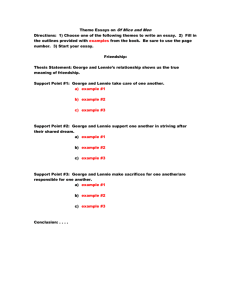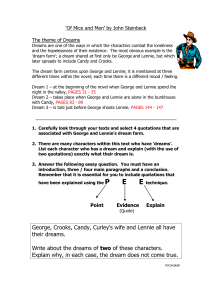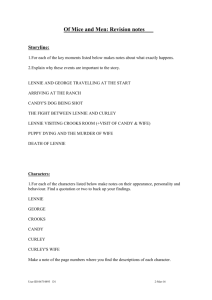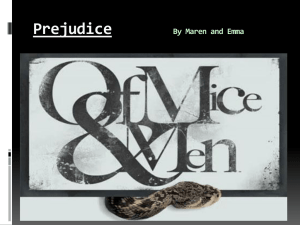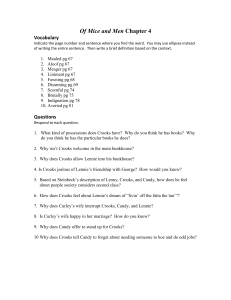Sample 5 Paragraph Thematic Essay
advertisement
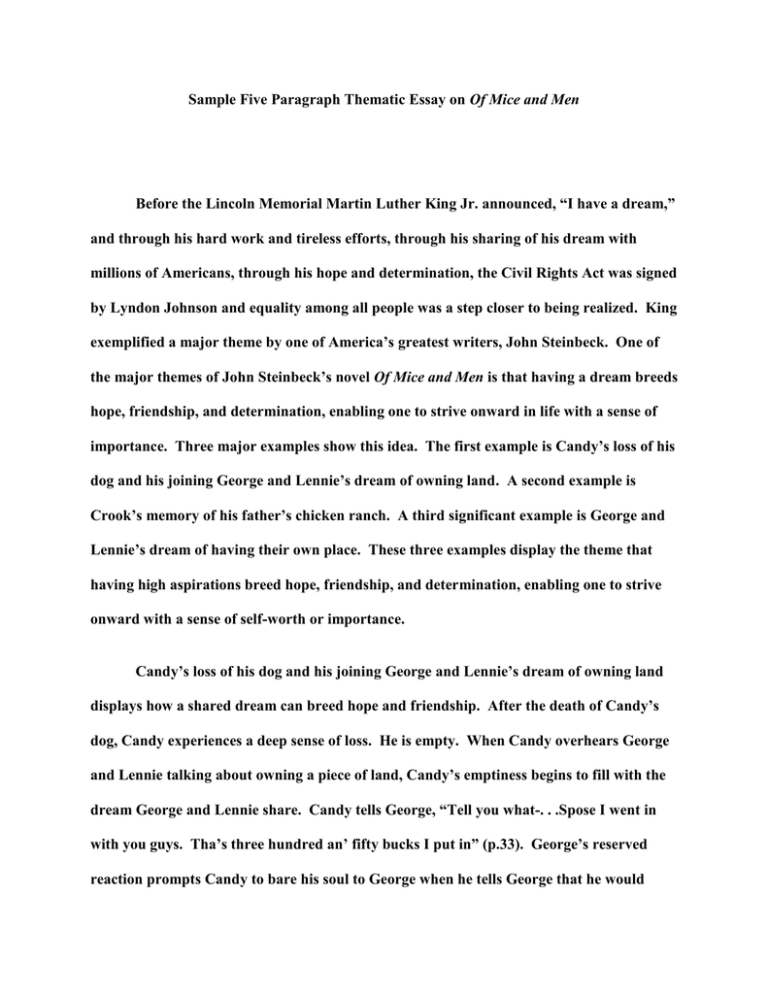
Sample Five Paragraph Thematic Essay on Of Mice and Men Before the Lincoln Memorial Martin Luther King Jr. announced, “I have a dream,” and through his hard work and tireless efforts, through his sharing of his dream with millions of Americans, through his hope and determination, the Civil Rights Act was signed by Lyndon Johnson and equality among all people was a step closer to being realized. King exemplified a major theme by one of America’s greatest writers, John Steinbeck. One of the major themes of John Steinbeck’s novel Of Mice and Men is that having a dream breeds hope, friendship, and determination, enabling one to strive onward in life with a sense of importance. Three major examples show this idea. The first example is Candy’s loss of his dog and his joining George and Lennie’s dream of owning land. A second example is Crook’s memory of his father’s chicken ranch. A third significant example is George and Lennie’s dream of having their own place. These three examples display the theme that having high aspirations breed hope, friendship, and determination, enabling one to strive onward with a sense of self-worth or importance. Candy’s loss of his dog and his joining George and Lennie’s dream of owning land displays how a shared dream can breed hope and friendship. After the death of Candy’s dog, Candy experiences a deep sense of loss. He is empty. When Candy overhears George and Lennie talking about owning a piece of land, Candy’s emptiness begins to fill with the dream George and Lennie share. Candy tells George, “Tell you what-. . .Spose I went in with you guys. Tha’s three hundred an’ fifty bucks I put in” (p.33). George’s reserved reaction prompts Candy to bare his soul to George when he tells George that he would ‘make a will an’ leave [his] share to [Lennie and George]” (p.34). George and Lennie allow Candy to share their dream, and this quickly breeds hope, as we find out a little later when Candy is constantly “figurin’ and figurin’” because of his excitement about the “ranch.” But even more importantly, Candy develops a friendship with George and Lennie which is evidenced later in the story when Candy confides in George, “I ought to of shot that dog myself. . .I shouldn’t ought to of let no stranger shoot my dog” (p.39). Candy confides in George about his inner feelings regarding his dog, showing the beginnings of a friendship. Candy’s actions convey the concept that dreams breed hope and friendship. A second example which shows that having a dream breeds hope and friendship is Crook’s memory of his father’s chicken ranch. Whereas Candy, Lennie, and George all look to their future for their dream, Crooks looks into his past, remembering the sense of joy he had as a small boy on his father’s chicken ranch. Crooks explains to Lennie that the “white kids [came] to play at our place, an' sometimes I went to play with them, and some of them were pretty nice” (p.46). In this passage Crooks alludes to his dream. He dreams of being able to communicate and be with others on an equal basis. He explains to Lennie that his “’ol man didn’t like” the white kids playing with Crooks. He tells Lennie, “I never knew till long later why he didn’t like that. But I know” (p.47), implying that Crook’s father was discriminated against because of his skin color. Crooks’ longing for equality in the form of companionship is reiterated later in the same chapter when Crooks bitterly tells Lennie, “Spose you couldn’t go into the bunkhouse and play rummy ‘cause you was black. . .A guy needs somebody – to be near him. . .a guy goes nuts if he ain’t got nobody. Don’t make no difference who the guy is, long’s he’s with you. . .a guy gets too lonely and he gets sick” (p.51). Crooks is sick. His illness stems from complete isolation, total discrimination. His illness is a bitterness caused by those discriminating against him. Ironically, Crooks’ bitterness is cured by Candy’s and Lennie’s inclusion of Crooks in their dream to buy some land. Crooks exposes himself to be hurt with discrimination when he offers to work like a “dog” if Candy and Lennie let him in on the dream. Crooks takes the chance of being deeply hurt again because he hopes he will realize his dream of being equal. When Lennie and Candy enter Crooks’ room, Crooks is reluctant to speak with them, and he is defensive. However, as the scene progresses, Crooks comes to a point where he bonds with his newfound companions. Crooks even tells George, “Lennie’s a nice fella” (p. 53), showing his excitement and hope of realizing his dream and having a “friend.” Although George crushes Crooks’ new-found hope and friendships, Crooks does display his momentary attainment of his dream when he tells Curley’s wife, “You got no right messin’ around in here at all. . .Now you just get out an’ get out quick” (p. 51). Crooks speaks to Curley’s wife with authority, forgetting the fact that he is black and discriminated against, as Curley’s wife reminds him when she threatens Crooks with his life and calls him a “nigger.” For a brief period of time, Crooks shows that he feels important because he is accepted as an equal by Candy and Lennie. Thus, Crooks displays the idea that having a dream breeds hope and friendship, enabling one to strive onward in life with a sense of importance and self-worth. A third significant example that having a dream breeds hope, friendship, and determination is George’s and Lennie’s dream of having their own place. For George the idea of owning his own place would allow him to keep Lennie from getting into trouble. But more importantly, this dream makes George strive toward a goal. George’s dream is not even close to becoming a reality until Candy offers to contribute three hundred and fifty dollars to the cause. At that point George, with “eyes full of wonder,” says, “I bet we could swing her” (p.42), and suddenly the dream has become a little more solidified, a definite possibility. George, Lennie, and Candy realize that this dream may come true “[r]ight squack in one month” (p.44). George resolves to save every cent possible to pay off the little ranch. With the knowledge that their dream can be realized, Lennie, Candy, and especially George not only bond as good friends and develop an optimism about their future, but they develop a determination which will enable them to improve their situation in their present lives. This determination is evidenced when George says, “We’ll do her. . .We’ll fix up that little old place an’ we’ll go live there” (p.45). George’s and Lennie’s dream of having their own place breeds hope, friendship, and especially a strong determination to make that dream a reality. This ultimately enables George, Lennie, and Candy to strive onward in life with a sense of self-worth and importance. The idea that having a dream breeds hope, friendship, and determination, enabling one to strive onward in life with a sense of self-worth and importance is a major theme in Steinbeck’s novel Of Mice and Men. Three examples show this idea, which runs throughout the novel. The first example is Candy’s loss of his dog and joining George and Lennie’s dream of owning land. Another example is Crooks’ memory of his father’s chicken ranch. A third example is George and Lennie’s dream of having their own place. Steinbeck obviously meant to impress upon his readers the idea that dreaming is an important part of every person’s life. When one dreams, he hopes, develops friendships, and shows determination, and as a result, he feels a strong sense of value. He learns to value himself more. Just as Martin Luther King Jr. realized, so too Steinbeck understood that to dream is a fundamental need of all people. Without dreaming nothing great is ever accomplished. But even more importantly, sharing a dream with others reaps not only rewards for an individual, but also rewards for all those involved and ultimately all of humanity.
